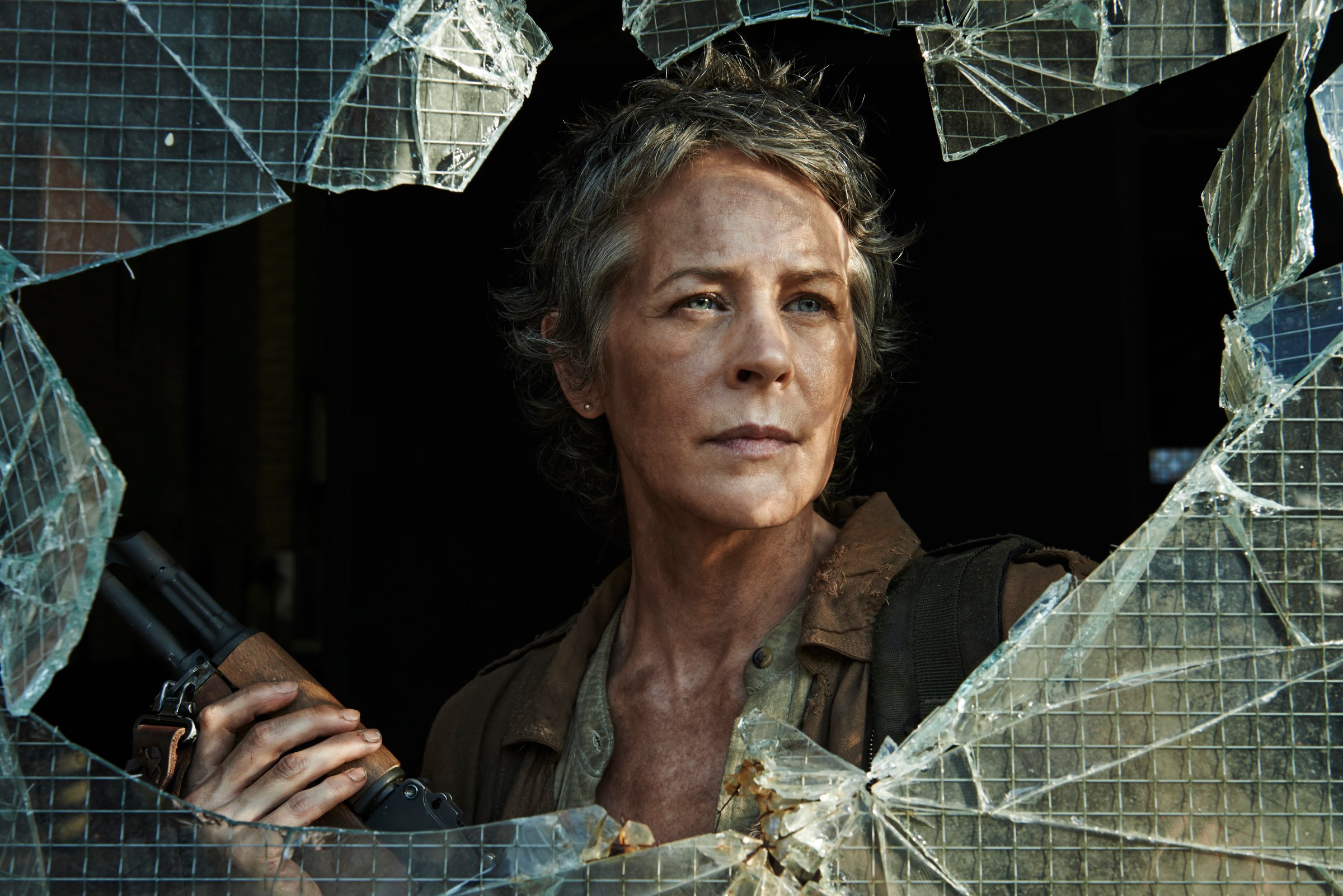
“Consumed,” the sixth episode of the fifth season of AMC’s The Walking Dead, is a slow burn. The good kind—one of the series’ occasional faults is whiplash-inducing gear shifts—in which we get to watch Carol and Daryl go on the hunt for Beth.
The adventures of this Butch and Sundance (or is it Thelma and Louise?) are interspersed with vignettes from Carol’s recent past, starting with her being fromerly ostracized from the group by Rick for her draconian problem-solving style. (It’s not quite the same as being cast out of paradise but, in their world, likely the closest thing to it.) This is supposed to remind us, I think, of Carol’s character arc over the course of the last five seasons, from cowed, battered wife to lone-wolf badass.
Carol and Daryl are a captivating pair. Both are outsiders, at times morally righteous and at others nihilistically resigned. Both have lost the most important person to them, Daryl his brother and Carol her daughter. Both are damaged goods, in other words, and as such have formed a particularly strong bond to each other. The question is, is it romantic?
By the normal rules of television, it shouldn’t be. In the book, Andrea and Dale have a completely believable romantic liaison, despite their age difference. In the television series, partly because of casting, that idea is laughable. “Consumed” is particularly compelling for teasing out the “what’s up with us?” quality of the friendship. This teasing includes a moderately awkward scene about who’s going to sleep on the top bunk and a dialogue in which Carol says to Daryl, “You were a kid, now you’re…a man.”
Otherwise, the episode consists mainly of the duo making their way through a ruined Atlanta—a family shelter familiar to Carol from her past, abandoned and luxurious legal offices, sky-bridges full of walkers squirming in sealed sleeping bags like fussy mummies—looking for the hospital tribe holding Beth. Throughout, they carry on a philosophical discussion of the weight of the past, the meaning of survival, and the epistemology of identity. You know, the usge. It’s a little like the School of Athens—with zombies—or Before Sunrise—with zombies. (Or, maybe even better, a level in the Last of Us.)
Along the way, they scavenge for supplies in a van teetering on the edge of a freeway overpass. When the vehicle gets over run by walkers and, ultimately, pushed off the edge, the two just barely survive the fall. The undead following off the ledge like lemmings and splattering all around gives new definition to purple rain.
Eventually, they run into Noah, the orderly Beth helped escape two episodes ago. At first, he steals their weapons, but later, Carol and Daryl catch up to him and they join forces, trading information about where Beth is being held. Having resolved to go save Beth, Carol is unexpectedly hit by a car and taken to the hospital in question. Daryl and Noah steal a truck and presumably head back to the church to get reinforcements.
All of this, it seems, sets us up for The Walking Dead’s familiar dynamic, it’s cruising speed of warring tribes girding for conflict. But this time, the battlefield—a megalopolis teeming with walkers—promises much more danger.
Zombie Kill Report
1 run over by car by Daryl; 1 knife to skull by Carol; 1 arrow to the head by Daryl; 4 sharp object to the head by Carol and Daryl; 1 knife to the face by Daryl; 3 gunshots to the head by Carol; 1 knife to the head by Daryl; 3 machete chops to the head by Daryl; 1 arrow to the head by Carol.
Estimated total: 16
The Window Metaphor
When Daryl and Carol are holed up in the shelter, they come upon a mother and child who have turned, clearly an echo of Carol and Sophia. The walkers claw at a door made of frosted glass. This is a recurring metaphor this season: the lines, whether opaque or completely clear, that separate the living from the undead. Progressively louder, the show’s writers seem to be asserting, “Walkers, they’re just like us.”
More Must-Reads From TIME
- The 100 Most Influential People of 2024
- Coco Gauff Is Playing for Herself Now
- Scenes From Pro-Palestinian Encampments Across U.S. Universities
- 6 Compliments That Land Every Time
- If You're Dating Right Now , You're Brave: Column
- The AI That Could Heal a Divided Internet
- Fallout Is a Brilliant Model for the Future of Video Game Adaptations
- Want Weekly Recs on What to Watch, Read, and More? Sign Up for Worth Your Time
Contact us at letters@time.com